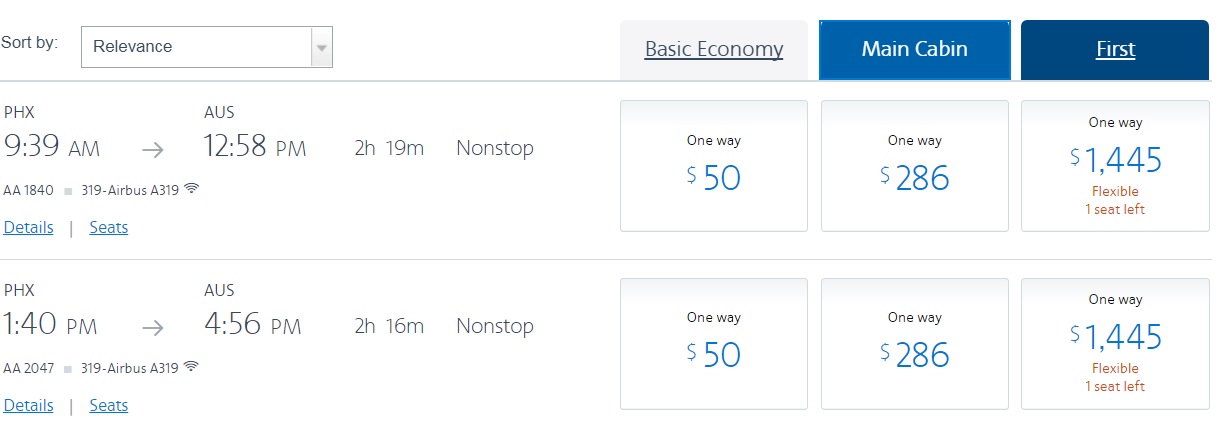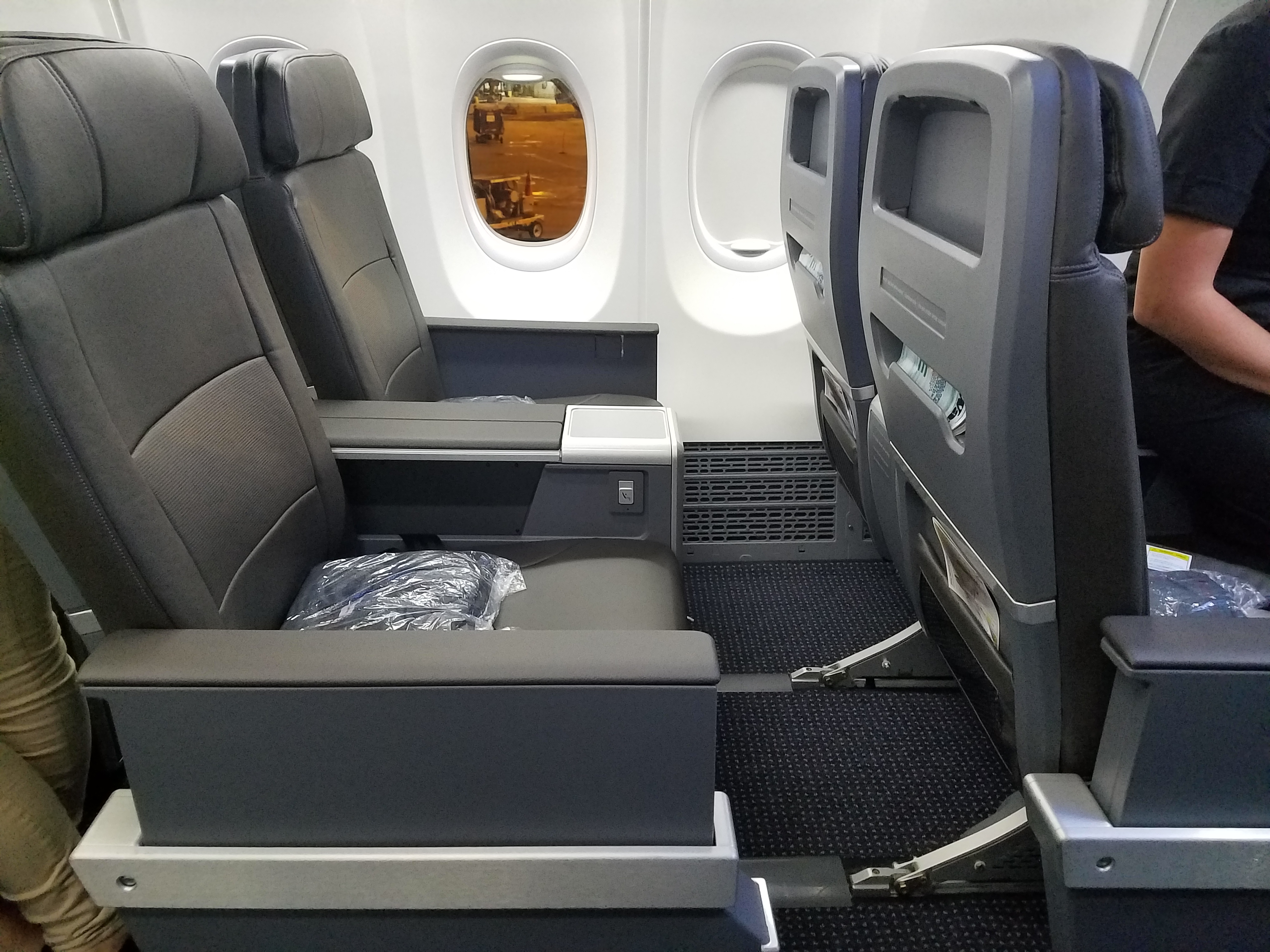The elimination of airline change fees is a good thing for consumers who are faced with greater uncertainty than ever in making travel plans. But the move is much more than that. What I tried to make clear immediately from United’s announcement that was quickly copied elsewhere (and in some cases improved upon) is that this is really about entrenching basic economy as the key differentiator between business and leisure fares.
At United the gap between Basic Economy (which won’t be changable at all) and other fares (no longer a fee) has grown. At American Airlines at first glance the reverse is true because travelers on Basic Economy tickets will be eligible for their elite benefits. You’ll be able to buy a Basic Economy ticket and get assigned an extra legroom coach seat and add yourself to the upgrade list.
Yet it’s American’s move that may do more to cement a whole new way of thinking about airline fares.
- Basic economy fares won’t earn credit towards elite status. Elite status honors the customer, not the fare, which is a huge leap forward in its own right.
- That will make elite status much harder to earn, for anyone working for a price sensitive business or traveling for leisure. Instead of earning status on a mix of tickets it’s only the higher-priced tickets that will help.

And Basic Economy has come a long way since being ‘just another $20 each way for full benefits’. Basic economy is the fare they want to offer price-sensitive customers who might choose another airline that’s discounting, and they use Basic Economy that way in order to still sell higher-priced tickets to business travelers.

In some ways, this is back to the future. In 2002 Ben Baldanza was a Vice President at US Airways when the airline declared that only full fare tickets would earn elite qualifying miles. Baldanza explained that the people who bought discount tickets weren’t offering the kind of loyalty that the airline was looking for. The decision was quickly reversed, and the airline soon found itself in bankruptcy.
The next year Delta Air Lines announced a change – that they backed off of – awarding only half an eliet qualifying mile per mile flown on the cheapest fares. They had already made the least expensive “L, U, and T” fares non-upgradable on domestic flights.
The largest U.S. airlines have since moved away from distance flown as a measure of loyalty, either with minimum spending requirements for elite status or like United offering to sell status outright based on spend and a minimum of four flights a year, regardless of time in the air.

Airlines have been working to use their loyalty programs to shift customers to higher fares, and to make status a benefit for only those flying on those high fares. Eliminating change fees on the one hand, while doubling down on using Basic Economy as the tool to segment customers, is the latest attempt at doing this.


@ Gary — What? It doesn’t make it harder for me. I can still buy 3 QR business round trips from LAX to SE Asia and pretty much have EXP for the year for about $8k. Then, for my domestic travel, I can buy/use miles for the cheapest AA tickets and get free upgrades.
Will B fares be upgradeable with SWUs?
This is what I was worried about when I first heard the news yesterday – it seems that all that will happen is the price of non-Basic Economy will rise by quite a bit. The only question now is how long this will take to happen. I would guess we may have a couple years where this is mostly just an increase in flexibility until business travel demand fully comes back and then prices for non-BE shoot up.
For those of us with lifetime Platinum status – and no hope of reaching EXP – this seems like very good news. I can buy cheap BE tickets, get seated in MCE and even get on upgrade lists for First. Or am I missing something?
The (large) company I work for puts people in Economy unless they’re in a non-stop blocked for over six hours. Even some TATL flights don’t qualify. But it also specifically blocks our employees from booking Basic Economy fares. I’m pretty sure a lot of other companies do the same.
This will primarily affect businesses which already have people flying in Basic Economy for work, and people flying on their own dime.
Good, lets hope OPM will be buying more basic economy as their corporate overlords tighten the belts – leaving top tier to those of us who pay our own way.
What fool would pay $1445 for a one way first class fare from PHX to AUS? It isn’t a long flight.
@ Bob — Just buy first. That’s pretty much what I do over 1.5 hours…
I can only guess that miles as a measure of loyalty was borne from early days trying to encourage more transcon/longer flights, and miles just stuck around out of habit.
Oh no. You brought up Ben B and US Airways from 2002. I think that was the start of the Cockroach movement. Oh the memories.
Why is no one ever happy in the frequent flyer community? Every move by airlines does not need to be some nefarious evil plan. Take the good moves and remember those when the bad happens.
For AA, at least (I think other guys do something similar, but I don’t know the programs), EQD is also a factor in qualification. So there was already a fare-class-based component to this. I don’t know what BE used to earn in EQD as I never bought those, but it can’t have been much.
So, is there really a big change here, or is it just a “more of the same” move with the EQM going away, but EQD still a major fare-based player anyway?
Cheers.
@TheOtherCarl – Lifetime Platinum also (and retired so won’t hit EP anymore). I found Basic Economy a valid option before this since I still got to preboard and check a bag (rarely needed but did happen) due to my status plus even with paying for a seat assignment it was many times hundreds less than “regular” economy. Only thing I missed was chance at an upgrade (which I willingly gave up for the savings) and reduced mileage credit (which I really don’t need anyway due to lifetime status).
Well now it is even better since you can purchase seats sooner to ensure you get what you prefer and have a shot at upgrades. Understand we will likely be at the tail end of the Platinum group (maybe even behind award ticket holders) but still there is a chance which is an improvement.
Overall I’m just fine with BE most of the time. If I want first I pay for it (or redeem miles) and if I’m just looking to get somewhere I pick that cheapest possible option.
On American, I’d have qualified for EXEC PLAT last year based on miles (I had well over 100K) but did not make it since they jacked up the MONEY you needed to spend and I was just short moneywise. This year I will make the reduced miles needed but fall short with money. It is nearly impossible to get the Equivalent DOLLARS needed unless you are buying First Class fares. I have never bought the Basic Economy but maybe that is what I should do in the future since I’ll never spend enough money with them even though I travel a lot. Sort of SAD how they ruined the programs.
I haven’t seen anyone mentioning this. But, higher level flyers (platinum on United for example) used to get free 24 hour change fees without paying for unavailable fare classes. This has not been included in the new change fee waiver. As planes fill up, this could be a big impact on top tier frequent fliers. Perhaps I misinterpreted something, but perhaps not.
When did Delta make “L, U, and T fares non-upgradable on domestic flights”? I believe that Basic Economy (E fares, I think) were not upgradable, but I never heard that L, U, & T fares were not upgradable
@Shana Gainey this started back in the late 90s, my point wasn’t to describe current policy
@Gary, you nailed it with this post. Those of us who hit Gold or Plat status with a mix of leisure and business travel relied on qualifying basic economy flights to put us over the hump. I think you will see a lot less Golds and Platinums going forward.
The economics will be fascinating to see whether the incremental cost to buy up to “regular” economy will still convince those hunting for status, or flexibility, to book the higher fare.